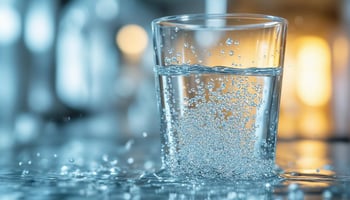A walk in the fresh air is considered the easiest way to reduce stress, boost your mood and get...
Why is water alone not enough for your workouts?
Water is important. But is it really enough to maximize your performance during training? The answer: not always. Your body needs more than just H2O, especially when you're training intensively and sweating.
Electrolytes: the underestimated game changers
Studies show that proper hydration with electrolytes can boost your performance, reduce fatigue and improve recovery. Many people underestimate how much a deficit affects their performance. In fact, around 50% of people start training dehydrated without realizing it. And for every percent of water loss, your performance decreases measurably.
Why electrolytes are essential
Electrolytes such as sodium, potassium and magnesium are essential for muscles and nerves. Your body loses these substances when you sweat - and this can drastically reduce your performance. A deficiency not only leads to muscle cramps and early exhaustion, but also to longer recovery times after training.
When you need electrolytes
Electrolytes are a real performance booster, especially if you train intensively for longer than an hour, sweat a lot or are active on warm days.
Our tip: LMNT - hydration without the frills
If you are looking for a clean electrolyte solution, LMNT is a great choice. No sugar, no artificial additives, just the minerals your body needs.
Exclusively for you
As a member of our community, you can get a free trial set (8 sachets, all varieties) - simply order via this [link] (insert link). The free item will automatically be added to your shopping cart. If it's not your thing, LMNT offers an uncomplicated money-back guarantee.
Conclusion: If you train hard, don't just think about water. Get electrolytes to get the most out of your workouts and recovery. Your body will thank you!
Sources:
-
Cheuvront, S. N., Kenefick, R. W. (2014). Dehydration and endurance performance. Sports Medicine, 44(2), 127-138.
-
Maughan, R. J., Shirreffs, S. M. (2010). Dehydration and rehydration in competitive sport. Scandinavian Journal of Medicine & Science in Sports, 20(3), 40-47.
-
Sawka, M. N., et al. (2007). American College of Sports Medicine position stand. Exercise and fluid replacement.Medicine and Science in Sports and Exercise, 39(2), 377-390.





Wir freuen uns über dein Kommentar: